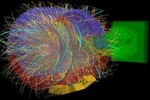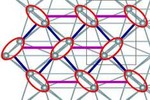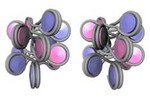Research Focuses of the Department of Physics
Matter under Extreme Conditions

During the development of the early universe and inside compact astrophysical objects, extreme temperatures and densities were realized that do not occur naturally on Earth and can only be produced and studied for fractions of a second by means of heavy-ion collisions, for example at CERN-LHC or GSI-FAIR. The research focus Matter under Extreme Conditions investigates the microscopic interactions and the resulting properties of matter under such conditions, which also requires extensive technological developments in the field of accelerator and detector physics. This focus includes research from the Institute for Nuclear Physics, the Institute for Theoretical Physics and the Institute for Applied Physics.
Since they were first detected in 2015, the gravitational waves that arise when compact astrophysical objects are merged have become an indispensable tool for measuring the gravitational interaction of large masses and the behaviour of matter under extreme conditions. In the field of astrophysics and gravitational waves, mergers of neutron stars are examined in particular, which provide direct information about general properties of matter at nuclear densities and beyond. The work in this area has direct connections with neighbouring research fields, e.g. heavy-ion physics. The subject of further theoretical and experimental investigations is the genesis of the heavy chemical elements in the course of such astrophysical processes.
Condensed Matter and Quantum Materials

The research focus Condensed Matter and Quantum Materials examines novel physical phenomena of solids of various sizes (from nano-scale to macroscopic materials), which result from a particularly strong coupling between the elastic properties of the material and its electronic quantum phases. The investigations focus on collective phenomena such as unconventional superconductivity, frustrated magnetism, electronic multiferroelectricity and topological quantum states and thus represent a connection to the research focus Light-Driven Processes in Atoms, Molecules and Organisms. Many-body phenomena of this kind are also investigated in quantum simulators consisting of light and ultra-cold atomic gases. On the one hand, these systems realize synthetic quantum matter with highly controllable properties and, on the other hand, also establish a reference to the research focus matter under extreme conditions, as relevant model systems can be simulated for this. Work on this research focus is carried out at the Institute of Physics and at the Institute for Theoretical Physics.
Light-Driven Processes in Atoms, Molecules and Organisms

The research focus Light-Driven Processes in Atoms, Molecules and Organisms spans an arc from isolated atoms to light-controlled processes in living things. It thus forms a bridge between the profile areas of Space, Time and Matter and the Structure and Dynamics of Life and links the classic disciplines of physics, chemistry and biology. Studies on atoms and simple molecules enable detailed investigation of the interaction between light and matter. Light makes it possible to manipulate solids such as quantum materials or molecules that occur in organisms in a targeted manner and to understand their dynamics. Processes are being developed that make it possible to control processes in complex systems including living organisms with light and make them representable. In the Physics Department, this research focus is carried out by researchers from the Institute for Nuclear Physics and the Institute for Biophysics.
- Studying at Goethe University
- International applicants
- Faculties
- Overview of study programmes
- Programme for refugees
- GRADE
- Goethe Business School (continuing education)
- Research at Goethe University
- Scientific news
- Goethe Welcome Center (for international researchers)
- Collaborative research projects
- Individual research
- Visiting fellowships
- Endowed chairs
- About the University
- News-in-brief
- University administration
- Campus locations
- Campus life
- University archives (German)
- Rhine-Main-Universities





